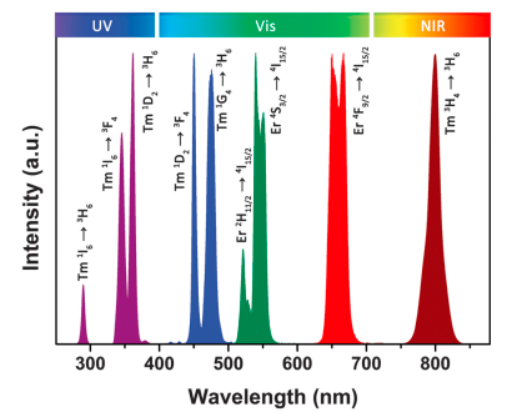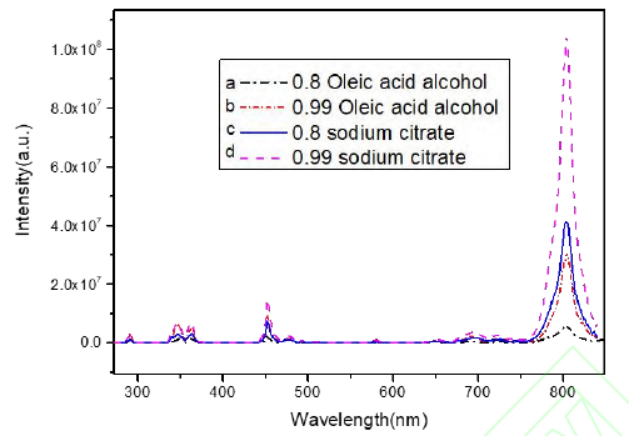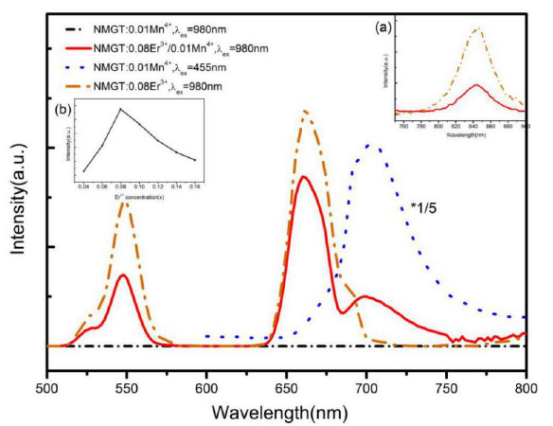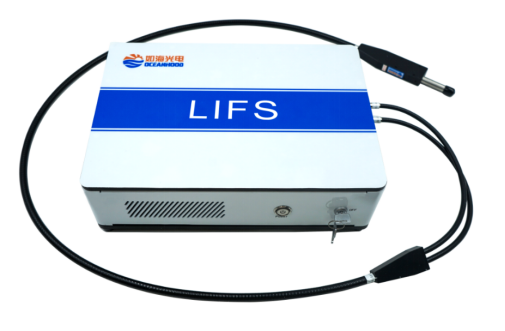<strike id="cmwmu"></strike>
|
簡(jiǎn)體中文|
English| Launch:2022-05-26 |
abstract
Lifs980 is highly integrated, light and convenient; High stability; It can select wiring array, area array and deep refrigeration spectrometer, and the output power supports 0-500mW adjustment, which is convenient for researchers to test the fluorescence emission spectrum of up conversion luminescent materials at different excitation power. The test results are objective and accurate. Customers can choose the most suitable products according to the application needs.
Research background
Upconversion luminescence refers to the phenomenon that materials absorb long wavelength low-energy light and emit short wavelength high-energy light, which is called anti Stokes luminescence. The mechanism is that the luminescence center absorbs two or more long wavelength photons, reaches the excited state through non radiative relaxation, and then releases short wavelength photons in the process of transition from the excited state to the ground state. The upconversion luminescence process can be divided into five mechanisms: ① excited state absorption (ESA); ② Energy transfer up conversion (ETU); ③ Cooperative up conversion (Cu); ④ Energy migration upconversion (EMU); ⑤ Photon avalanche (PA). Fig. 1 shows the implementation process of five up conversion luminescence mechanisms.

Fig. 1 five upconversion luminescence mechanisms
Photon up conversion is an important nonlinear anti Stokes luminescence phenomenon, which has broad application prospects in the fields of solar cells, biomedical imaging, information security, temperature sensors and so on. Rare earth ions are a kind of ideal up conversion luminescence centers, which can realize up conversion luminescence with fine adjustable emission wavelength and covering near infrared visible near ultraviolet.
Upload material research content
Taking the application of solar cells as an example, up conversion materials can convert infrared light into ultraviolet and visible light with higher energy, which can be absorbed by semiconductors. It is an important means to expand the use of infrared light for photocatalysis. The combination of up conversion materials and semiconductor materials is one of the simplest and most effective methods to prepare efficient near-infrared photocatalytic materials. The fluorescence emission spectrum of upconversion materials is an important means to characterize their properties. Under the excitation of 980 nm semiconductor laser, Yb3 + - Er3 + Co doped up conversion luminescent material can emit green light at 525 and 550 nm, and its emission peak corresponds to 2h11 / 2 / 4S3 / 2 → 4i15 / 2 transition, and its emitted red up conversion luminescence at 660 nm corresponds to 4f9 / 2 → 4i15 / 2 transition, as shown in Fig. 2.

Fig. 2 luminescence spectrum of Yb3 + - Er3 + / Yb3 + - Tm3 + Co doped up conversion material under 980 nm excitation
Wu Jialing studied the difference between NaYF4: Yb3 + / Tm3 + synthesized by oleic acid alcohol and sodium citrate assisted hydrothermal synthesis. The up conversion emission spectrum of NaYF4: Yb3 + / Tm3 + measured under 980 nm excitation is shown in Figure 3. It can be seen from the figure that the up conversion luminous intensity of NaYF4: Yb3 + / Tm3 + Prepared by sodium citrate method is greater than that prepared by oleic acid alcohol method; The luminous intensity increases with the increase of Yb ion concentration. And under the same other conditions, the larger the size of microcrystals, the greater the fluorescence intensity.

Fig. 3 upconversion emission spectrum of NaYF4: Yb3 + / Tm3 + excited at 980 nm
By measuring the upconversion emission spectra of Er3 + and Mn4 + single doped and Er3 + / Mn4 + Co doped nmgt phosphors in the range of 500-800 nm under 980 nm laser excitation, and the emission spectra of nmgt: 0.01mn4 + in the range of 600 nm-800 nm under 455 nm excitation, it is determined that the best composition of the sample is nmgt: 0.08er3 + / 0.06yb3 + / 0.002mn4 +, as shown in Figure 4. Illustration (a) in Figure 4 further shows the upconversion spectra of nmgt: Er3 + and nmgt: Er3 + / Mn4 + in the region of 750 nm-900 nm. Using 980 nm laser as excitation source, two strong emission bands near 544 nm and 656 nm and a weak emission band centered at 850 nm were observed in nmgt: 0.08 Er3 + phosphor, which were produced by 2h11 / 2, 4S3 / 2 → 4i15 / 2, 4f9 / 2 → 4i15 / 2 and 4S3 / 2 → 2i13 / 2 transitions of Er3 +, respectively. Illustration (b) in Fig. 4 shows the change of fluorescence intensity of emission band corresponding to Mn4 +: 2e → 4a2 transition when Er3 + with different concentrations is doped. The emission intensity of Mn4 + increases with the increase of Er3 + content, and when it reaches the maximum value, x = 0.08. When the Er3 + doping content is greater than 0.08, the emission intensity decreases gradually due to concentration quenching.

Fig. 4 upconversion spectrum of nmgt: xer3 + / zmn4 + (x = 0,0.08; Z = 0,0.01) excited at 980 nm and emission spectrum of nmgt: 0.01mn4 + excited at 455 nm. Inset (a) upconversion spectrum of nmgt: Er3 + in 750 nm-900 nm region (b) relationship between emission intensity of Mn4 + and Er3 + concentration
Lifs980 laser induced fluorescence spectrometer
Lifs980 is highly integrated, light and convenient; High stability; It can select wiring array, area array and deep refrigeration spectrometer, and the output power supports 0-500 MW adjustment, which is convenient for researchers to test the fluorescence emission spectrum of up conversion luminescent materials at different excitation power. The test results are objective and accurate. Customers can choose the most suitable products according to the application needs.

Fig. 5 lifs 980 nm laser induced fluorescence spectrometer
References: Dong, Hao; Sun, Ling-Dong; Yan, Chun-Hua (2015). Energy transfer in lanthanide upconversion studies for extended optical applications. Chem. Soc. Rev. 44(6), 1608–1634.doi: 10.1039/C4CS00188E
吳佳玲.稀土離子摻雜的微晶體上轉(zhuǎn)換發(fā)光特性研究[J/OL].激光與光電子學(xué)進(jìn)展:1-14[2021-11-10].http://kns.cnki.net/kcms/detail/31.1690.TN.20210712.1655.056.html.
黃蕊. 980 nm激發(fā)下稀土離子敏化的Mn4+的上轉(zhuǎn)換發(fā)光[D].湘潭大學(xué),2020.

